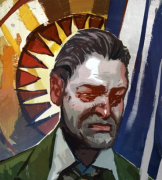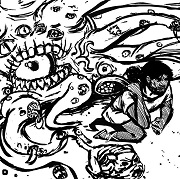|
Fidel Cuckstro posted:Ok I feel like I hit it out of the park with that 13th Age question. Closest I can think of is narrative games like Cortex, where you can create assets or advantages for other players to use.
|
|
|
|

|
| # ? Jun 3, 2024 20:37 |
|
Fidel Cuckstro posted:I've seen a few videos about the WFRP system that seems like it could be headed in the right direction, but now with 13th age I have like 5 PDFs I should probably pick up when I get my bonus next year. I am GMing a test game of this right now and I hate it so much.
|
|
|
|
I love WFRP, but you have to know what it is you're getting in to. It's not D&D for sure. Or Pathfinder.
|
|
|
|
Fidel Cuckstro posted:Ok I feel like I hit it out of the park with that 13th Age question. 13th age Montages are great for this. I’m terrible at explaining them so here’s a blog post that gives a quick explanation, and some system agnostic advice for how to use them. https://pelgranepress.com/2018/03/01/13th-sage-more-uses-for-montages/ quote:Here are the basics of running a montage:
|
|
|
|
3 Action Economist posted:I love WFRP, but you have to know what it is you're getting in to. It's not D&D for sure. I like the setting and the vibes, and I like the adventures I've read, but 4e, which I'm running, is incredibly fiddly, overengineered and under-edited. It's a really rough experience as soon as you have to actually use the system.
|
|
|
|
Chevy Slyme posted:13th age Montages are great for this. I’m terrible at explaining them so here’s a blog post that gives a quick explanation, and some system agnostic advice for how to use them. oh I both love this and am stealing this immediately
|
|
|
|
Megazver posted:I like the setting and the vibes, and I like the adventures I've read, but 4e, which I'm running, is incredibly fiddly, overengineered and under-edited. It's a really rough experience as soon as you have to actually use the system. I've played a fair bit of 2ed, which was great, but 4th was so riddled with errors and fiddly bullshit that I immediately shelved it.
|
|
|
|
Chevy Slyme posted:13th age Montages are great for this. I’m terrible at explaining them so here’s a blog post that gives a quick explanation, and some system agnostic advice for how to use them. Nice  On the WFRP stuff- I’ll be honest it’s probably more the system that got ported to Star Wars RPG as narrative dice…and probably more my interpretation of a vague explanation than Matt Colville gave (likely not accurate to the actual system) in a video.from how he described it- it sounded like around-the-table process of players adding different dice into a single pool that would get rolled in the end to generate a final “what happened” result. And- this is almost me imagining a system that doesn’t exist- but I liked the idea of something like that for big skill challenges over what 4e and PF2e and other systems have laid out -as opposed to doing a bunch of individual rolls one by one and trying to weave those in to a narrative on the fly, it felt more heist-like in the players building a plan and the GM adding complications…then rolling one big dice pool and working out a single successs/fail narrative off that -I liked the idea of players going around deciding what to contribute to the pool. It’d give the players a strategic discussion to have (how many dice should we aim to have? Are we aiming for success or ultra-success?) as well as tactical stuff (if you add 2 basic dice I can add a proficiency die and then someone else can use a skill fest to force the GM to remove a die…) -it seemed like an opportunity to abstract away from everyone wondering what particular skills they have- I really like the background system as described for 13th age and want to dig in to that more
|
|
|
|
Fidel Cuckstro posted:Nice PF2E tends to handle things like this with points based subsystems; (See Here on AoN: https://2e.aonprd.com/Rules.aspx?ID=1187 - this stuff is covered in the GameMastery Guide, and, i assume, reprinted/cleaned up in GM Core, though I've not had the chance to read the latter). Sky King's Tomb in particular, loving loves subsystems. The key to making htem feel a bit more dynamic and improvisational is mostly not in the mechanics, but, on the GM side, in being free handed about defining what earns a point and being able to comfortably set DC's on the fly. You don't roll one big dice pool, but the idea is that all of those bits of player action are still moving slowly towards a finish line. At my SKT table, we generally almost always spend most of every subsystem encounter doing exactly what you're describing - the GM lays out a challenge or set of challenges, we go around the table deciding what sort of actions we're going to contribute to the "pool" based on what we're good at and what seems most important, we decide whether to play it safe and roll for 'easy' crits, or shoot for more challenging actions that might award more points or some kind of bonus reward with a higher risk of failure, we have complications introduced (often by one player or another deciding to do something very in character and very stupid) that force other people to try something else... and then, instead of rolling one big pool of dice, we all roll individual checks and add up the points. And sometimes we do that in multiple rounds, or we do it montage style in initiative order (this is basically what the Chase Subsystem ends up being), or sometimes it's a quick obstacle and it gets solved basically immediately by one of our checks. But this doesn't have to be a problem solved by rules. (That said, 13th age montages are cool as gently caress. They really are the best way to handle "I didn't actually prep any encounters for this, but we need to explain how you all got from a to z here...")
|
|
|
|
I believe that Agon does some "collective dice in a pool determine overall outcomes" stuff for large collective actions.
|
|
|
|
Charbuild question. I'm in a Kingmaker campaign (which is mainly hexploration), and my character is a self-sufficient forest hermit Ranger. Conceptually, she's the nature, terrain, and wilderness survival expert outside of combat and the archer-beastmaster in combat. Definitely a Bear Grylls-ish branch-hopping hunter-tracker warden type, rather than a magical hippie in-touch-with-the-trees druid type. Stats-wise, she's a Whisper Elf Ranger with the Borderlands Pioneer background. This all makes sense for her role, character, and backstory, but I'm worried it might gimp me. I took Elven Lore as my initial Ancestry Feat. Ranger, Borderlands Pioneer, and Elven Lore all give Trained in Nature. It doesn't look like those stack, and that might be bad or something? How much am I losing out on by doing that? Edit: I'm also not sure which skills to maximize. Survival, Nature, Stealth, and Crafting seem like the most important ones, though Acrobatics, Medicine, Lore: Wilderness Type, Arcana, and Occultism also make sense in context. Maybe I'll see which ones I can get Legendary, Master, and Expert in... Pollyanna fucked around with this message at 21:41 on Dec 20, 2023 |
|
|
|
Pollyanna posted:Charbuild question. I'm in a Kingmaker campaign (which is mainly hexploration), and my character is a self-sufficient forest hermit Ranger. Conceptually, she's the nature, terrain, and wilderness survival expert outside of combat and the archer-beastmaster in combat. Definitely a Bear Grylls-ish branch-hopping hunter-tracker warden type, rather than a magical hippie in-touch-with-the-trees druid type. Normally when you have redundant Trained in a particular skill, you get Trained in additional skills. Elven Lore specifically says, "If you would automatically become trained in one of those skills (from your background or class, for example), you instead become trained in a skill of your choice." I believe the same principle applies automatically when your class and your background give you the same skill.
|
|
|
|
Pollyanna posted:Stats-wise, she's a Whisper Elf Ranger with the Borderlands Pioneer background. This all makes sense for her role, character, and backstory, but I'm worried it might gimp me. I took Elven Lore as my initial Ancestry Feat. Ranger, Borderlands Pioneer, and Elven Lore all give Trained in Nature. It doesn't look like those stack, and that might be bad or something? How much am I losing out on by doing that? Elven Lore, at minimum, gives you a replacement skill training if you're already trained in Nature (or Arcana) from another source like class or background, so you're not missing out on anything on that front. Pathbuilder also seems to suggest that you'd get another replacement skill training for your background's Trained in Nature as well. I plugged in what you said and got this:  One of those Skill Training entries is the Arcana for Elven Lore, but the second as well as the Extra are both open picks.
|
|
|
|
Oh gotcha, so those end up being a free skill choice? That solves that problem, then!
|
|
|
|
yeah if you try and fill out a sheet in pathbuilder, it'll pull up a prompt to choose a different skill whenever they overlap I wouldn't worry too much about breadth of skills either. Since kingmaker is a 1-20, you'll notice that as it goes on, everyone more or less has three tagged skills* that they're extremely reliable at; anything at just Trained is an emergency backup or useful for the Aid action at best. This doesn't kick in until around 8 when you get multiple Expert level skills, so it might not be immediately apparent. *rogues and investigators get six Mister Olympus fucked around with this message at 21:45 on Dec 20, 2023 |
|
|
|
Pollyanna posted:Oh gotcha, so those end up being a free skill choice? That solves that problem, then! Yeah, Elven Lore is explicit about it: "If you would automatically become trained in one of those skills (from your background or class, for example), you instead become trained in a skill of your choice." Presumably the background is the same, but it doesn't nave that explicit language calling it out.
|
|
|
|
It's part of the general rules for backgroundsquote:If you gain the trained proficiency rank in a skill from your background and would then gain the trained proficiency rank in the same skill from your class at 1st level, you instead become trained in another skill of your choice.
|
|
|
|
In no way, what-so-ever related to Pollyanna's question about playing in a KM game... I am running a KM game I'm having challenges internalizing Reconnoiter rules. How I think it works: Party uses a hexploration action Party explores the hex and reconnoiters it. The part can "Map the Area", gaining a bonus to "navigate the hex". If the hex has a non-secret feature, they find it (e.g. Fort Serenko in RL5 If the hex has a Secret tagged item, GM rolls Perception of the (Character? Party?) and if they beat the Secret DC they find the Secret. Is my understanding accurate? Follow-up question: If a Hex had a a Secret item and the party fails, do you give any indication that there is more to this location or just leave it be?
|
|
|
|
I've recently learned that PF2E can be pretty drat painful as a system if your party composition is too lopsided. It's my friend's custom campaign and the party ended up being an Armor Inventor (me, also the only real frontline), a Chirurgeon Alchemist, a very healing oriented Animal Order Druid (a godsend because the pet is pretty much about as competent a frontliner as I am) and a Dragon Bloodline Sorcerer. Our party has way too much healing and way too little damage and Inventor is really not a class meant to hold up as the only up close and personal combatant. Honestly playing it I'm not sure WHAT the expected role of an Inventor is but that's neither here nor there. Every mildly difficult fight devolves into a lot of me trying to tank everything, not succeeding and my HP going up and down like a yo-yo as the two healers try to keep me up. The sorcerer is facing the low level caster in PF2E problem of just not having enough spells and those spells not being impactful enough. I still like PF2E but drat combat in that particular campaign is annoying. On the other hand our previous campaign (Extinction Curse) was extremely breezy due to having both a Barbarian AND a Fighter going around deleting things. It's still pretty funny to me just how ridiculously powerful Fighters are in this system, honestly.
|
|
|
|
turns out being able to reliably hit things is good combat skill
|
|
|
|
Inventor is basically a science/steampunk-themed martial character. Having two healers is an obvious problem that your party should have seen at the outset. One healer is fine, two characters spending their whole action economy on it is redundant. Two frontliners is much better in a party composition since they can help each other flank.
|
|
|
|
bewilderment posted:Inventor is basically a science/steampunk-themed martial character. The whole issue came from the Alchemist player originally intending to be a Rogue, but the player got way more attached to a different concept pretty close to game start. In general everyone picked classes (and free archetypes) with more of a focus on narrative than minmaxing which ordinarily is fine but in this case has ended up being a bit problematic. It's still mostly fine, I'm just venting after a particularly annoying encounter last time we played. Our GM is good enough things still mostly work out. Also right now I basically have two big problems with Inventor: Overdrive having a pretty significant chance of failure (why the heck does it have that it's like if Barbarians could fail to rage!) and basically everything they can do being a Manipulate action therefore making them extremely vulnerable to enemy reactions. Which kinda sucks when you're expected to be the main frontline!
|
|
|
|
Cyouni posted:Yeah, make sure you have Rounds (arquebus) or whatever your gun is. this was the one, thank you!
|
|
|
|
Infinity Gaia posted:Also right now I basically have two big problems with Inventor: Overdrive having a pretty significant chance of failure (why the heck does it have that it's like if Barbarians could fail to rage!) and basically everything they can do being a Manipulate action therefore making them extremely vulnerable to enemy reactions. Which kinda sucks when you're expected to be the main frontline! But yeah Overdrive should not be based on a Standard DC which seems to give a roughly 1 in 3 chance of failure (stat nerds feel free to
|
|
|
|
Isn't inventor viewed similarly to the alchemist, investigator, and swashbuckler, where they're considered functional but sub-par compared to other classes? Like, yes, you can optimize them all to the hilt, but unless you're wanting to take advantage of very specific builds, you're probably gonna be kinda bleh?
|
|
|
|
mind the walrus posted:But yeah Overdrive should not be based on a Standard DC which seems to give a roughly 1 in 3 chance of failure (stat nerds feel free to I actually will come in for this one. For each level up to 10, the standard DC is 15/16/18/19/20/22/23/24/26/27. Inventor bonus, assuming a +4 base Int and getting generic bonuses a level behind the item, is (+) 7/8/11/13/14/15/18/19/20/22. Thus, the percentage of failure is 35/35/35/30/30/35/20/20/25/20. So it starts at ~1 in 3, but after level 7 cuts to ~25%, and stays pretty consistent from there (except for the last two Int boosts from Apex and 20, which increase again).
|
|
|
|
Couldn't you also take assurance in crafting? Sure, you'll never crit if you use assurance, but if you need to make sure you don't fail or crit fail, it might not be a bad option. (Still a dumb mechanic IMO, but  ) )
|
|
|
|
Dick Burglar posted:Isn't inventor viewed similarly to the alchemist, investigator, and swashbuckler, where they're considered functional but sub-par compared to other classes? Like, yes, you can optimize them all to the hilt, but unless you're wanting to take advantage of very specific builds, you're probably gonna be kinda bleh? Nah, inventors are fine numbers wise. Certainly way better than an unoptimized alchemist or investigator.
|
|
|
|
Dick Burglar posted:Isn't inventor viewed similarly to the alchemist, investigator, and swashbuckler, where they're considered functional but sub-par compared to other classes? Like, yes, you can optimize them all to the hilt, but unless you're wanting to take advantage of very specific builds, you're probably gonna be kinda bleh? Inventor is on the lower side of power but is better than those three and is mostly fine
|
|
|
|
Honestly, Swashbuckler doesn't really belong in the Alchemist/Investigator tier either. It mainly suffers from getting some important tools relatively late, but after level 8 or so, they keep up with just about anyone if they're built right, which isn't something that requires gobs of system mastery beyond "Bleeding Finisher Good"
|
|
|
|
Wait, investigator sucks? After I'm already committed to playing one in my current campaign? 
|
|
|
|
I GM'd some low-level Investigators in one-shots and it seems to have a higher curve for feeling good, with players needing to really um... investigate the combat tactics they want to use that other classes can kind-of do more easily and at least as effectively. Thaumaturge in-particular has a lot of "what if Investigator but 'non-religious but spiritual?" going for it. I don't think it's that dire though, especially if your table has the ability to be even a little flexible in the name of cooperation.
|
|
|
|
The big problem with Investigator imo is that it has a lot of feats and features related to uhh... Investigating things. Which can be kind of a bummer if the campaign ends up not really having anything to investigate.
|
|
|
|
Infinity Gaia posted:The big problem with Investigator imo is that it has a lot of feats and features related to uhh... Investigating things. Which can be kind of a bummer if the campaign ends up not really having anything to investigate. Yeah, I think the usefulness of it is somewhat campaign- and GM-dependent.
|
|
|
|
ZZT the Fifth posted:Wait, investigator sucks? After I'm already committed to playing one in my current campaign? It doesn't suck, but IMO, along with the Alchemist, it requires a higher level of system mastery, and some amount of buyin from the rest of your group and/or a campaign that's complementary to the out of combat gimmickry you can bring to the table and a GM that can reward that gimmickry. Like, for example, Alchemist can be extremely strong in terms of the amount of support and buffs they can provide to a party... but, it sure does suck to make a character who is a Potion Vending Machine when your allies constantly forget to use the goddamn potions you keep handing out. Investigators can absolutely shine on a campaign that's full of meaningful exploration and social situations where they get to put all their skills to work, but, again, if the GM isn't going to make a point of helping you notice things with That's Odd, or if you're not able to pursue meaningful leads that regularly connect to the combat encounters you face, it can quickly feel like your character is a square peg trying to fit into a round hole and just not working properly. By contrast, the Inventor and the Swashbuckler both mostly work fine anywhere, and don't really have the sort of hurdles that those other two face to hit their baseline use. At worst, they have some fiddly action economy that takes a little more getting used to than a barbarian's "Rage, then strike a whole lot", but the payoff for that is mostly just in "You get to have a more fiddly action economy, which some people find fun, and which has specific narrative flavor", rather than "does more (damage, utility, whatever) than the Barbarian who Rages and then strikes a whole lot". Some people are really bothered by that, but those people should just play the barbarian.
|
|
|
|
Chevy Slyme posted:Some people are really bothered by that, but those people should just play the barbarian.
|
|
|
|
Dick Burglar posted:Couldn't you also take assurance in crafting? Sure, you'll never crit if you use assurance, but if you need to make sure you don't fail or crit fail, it might not be a bad option. Assurance will never succeed against a standard leveled DC. Edit: Math slightly wrong. Assurance will succeed at exactly levels 7 and 8, and then never succeed again. Still a bad idea.
|
|
|
|
I forgot that assurance only adds proficiency, and absolutely nothing else. Oof.
|
|
|
|
Inventor also has a slight problem where Unstable effects are effectively non-magical focus spells that you can effectively use one of every fight. But focus spells just got a lot easier to use more than one of every fight at mid to high levels without investing feats, and Inventors don't because they're using a whole class-specific subsystem for their encounter effects and you can't just port over the focus spell changes like you can with a class like Oracle. Still, if/when they get retuned, they'll probably be fine. Lower power and a bit clunky at times unless they really retune it, but fine.
|
|
|
|

|
| # ? Jun 3, 2024 20:37 |
|
ZZT the Fifth posted:Wait, investigator sucks? After I'm already committed to playing one in my current campaign? Basically, in combat they're generally a worse rogue. (I say generally, because Devise can let you do some strong things that rogue can't manage, but that requires more system mastery.) If you never get Devise down to a free action, it can really struggle. So a lot of it is based on what you can do outside of combat. Since a lot of setups are so combat-first, you can see where the problem might lie.
|
|
|




































